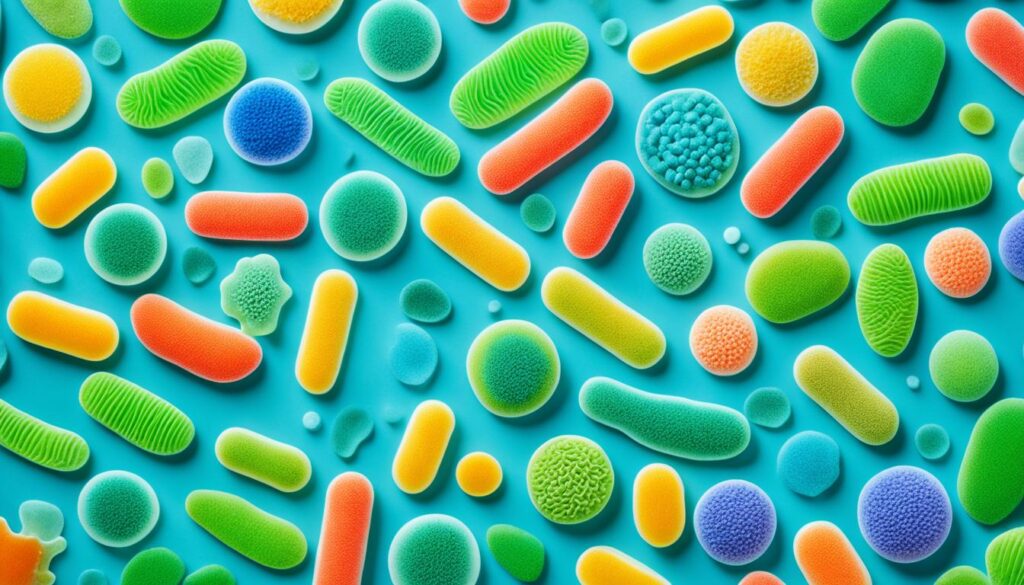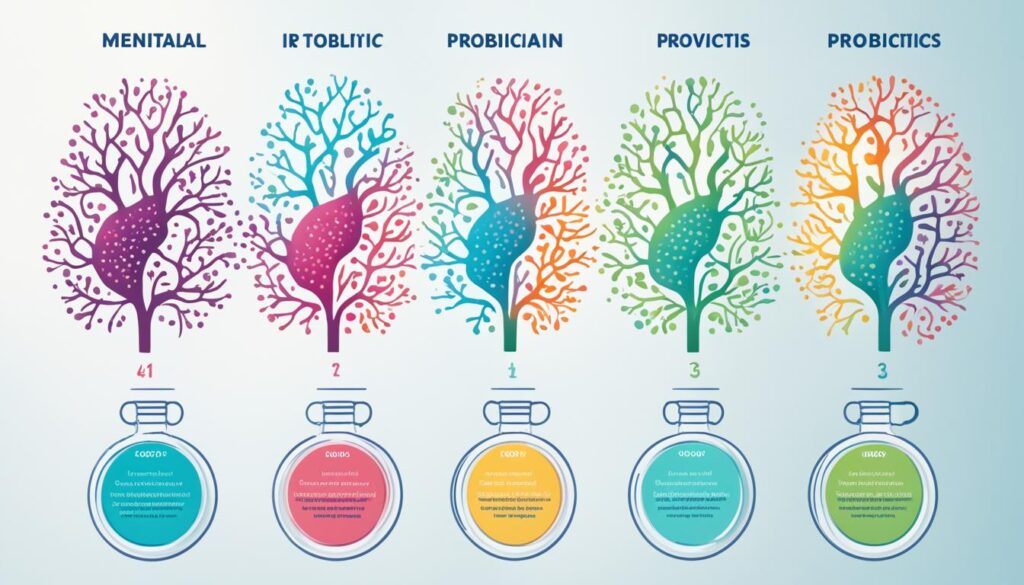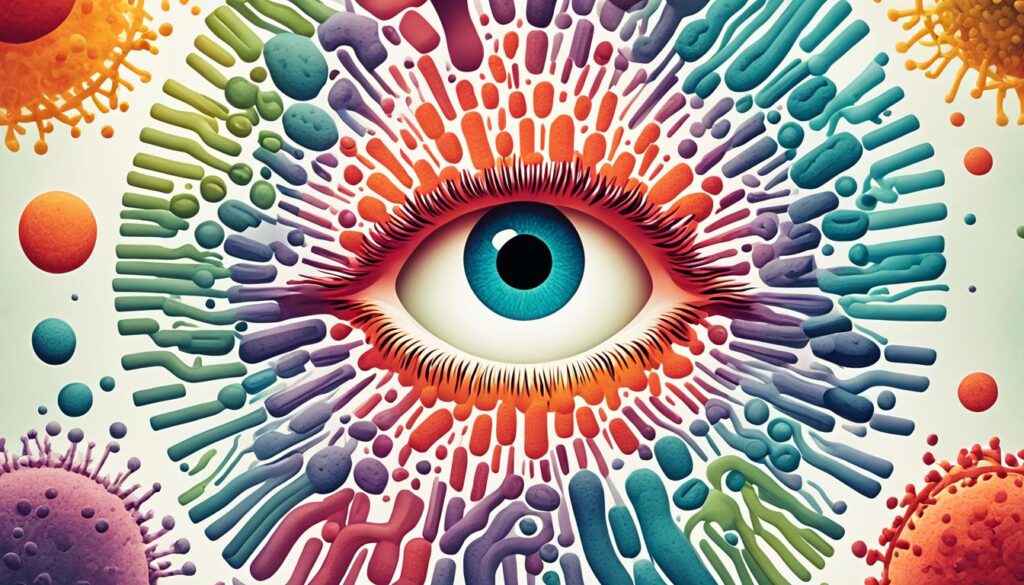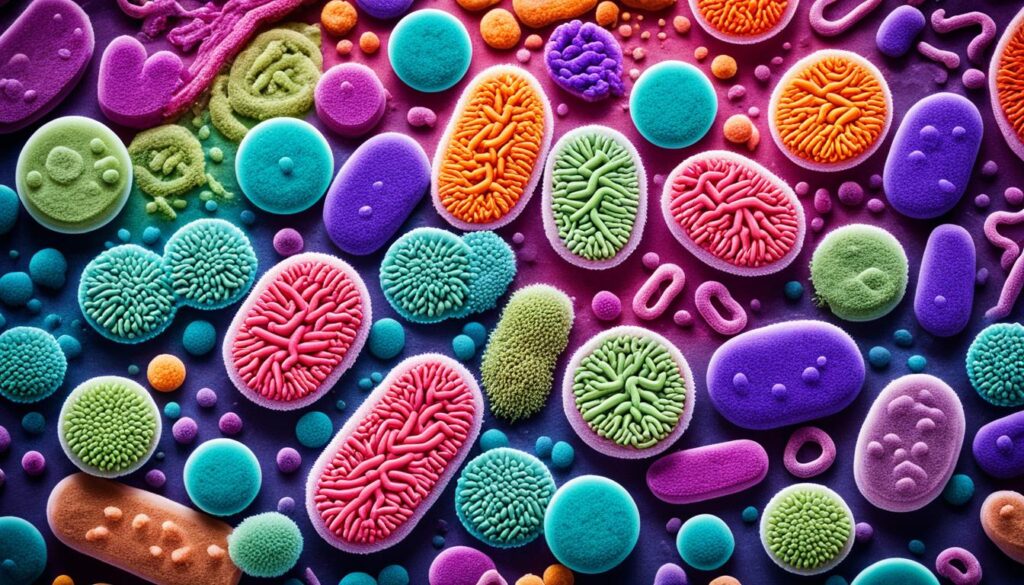Probiotics For Mental Health Recent studies have linked the gut’s health to our mental well-being. It seems the good bacteria in our gut, known as probiotics, can really make a difference. They talk to our brain through a special connection called the gut-brain axis. This can help ease feelings of anxiety and depression.
Some probiotic strains, notably Bifidobacterium and Lactobacillus, can change how our brain chemicals work. They also lower inflammation and help us handle stress. Best of all, adding probiotic-rich foods to your diet, such as yogurt, kefir, sauerkraut, and kimchi, might improve your mental health.
On top of eating right, you could think about taking probiotic supplements. It’s smart to talk with a doctor first. They can guide you on how much to take and what brand to choose. Remember, seeing mental health changes from probiotics may take a while. This is because our gut needs time to adjust to the new bacteria.
Key Takeaways
- The gut microbiome can communicate with the brain through the gut-brain axis, influencing mood and mental wellbeing.
- Specific probiotic strains like Bifidobacterium and Lactobacillus can have therapeutic benefits for mental health.
- Incorporating probiotic-rich foods and supplements may support mental health, but it can take a few weeks to notice the benefits.
- Consulting a healthcare provider is recommended when considering probiotic supplementation for mental health.
- The potential of probiotics in treating conditions like depression is an area of active research.
Probiotics For Mental Health: The Gut-Brain Connection
The gut and brain have a strong two-way connection known as the gut-brain axis. It connects the nervous, endocrine, and immune systems, letting the gut’s bacteria affect the brain and behavior. In turn, the brain can also impact the gut.
Understanding the Gut-Brain Axis
The gut has its own nervous system, dubbed the “second brain,” affecting brain work and emotions. Neurons and chemicals allow the gut to talk to the brain, forming a give-and-take relationship. This link is crucial for our emotional and mental well-being.
The Role of Gut Microbiota in Mental Well-being
Gut bacteria, numbering in the trillions, greatly influences our mental health. They churn out chemicals like serotonin and dopamine, key for our mood and behavior. If this balance is off, it can lead to stress, anxiety, and depression.
Potential Mechanisms of Action for Probiotics
Probiotics, those helpful bacteria found in foods and capsules, can tweak the gut-brain axis. They work by boosting a healthy gut system. This action can help in many ways, reducing brain inflammation, aiding in producing the right mood chemicals, and keeping the digestive tract strong. All this helps keep the mind in good shape, less prone to stress and bad moods.
Researched Probiotic Strains for Stress and Anxiety

Many probiotic strains show promise in helping with mental health. However, some have been looked at more when it comes to fighting stress and anxiety. Let’s dive into some of the highly studied ones:
Bifidobacterium longum 1714
Bifidobacterium longum 1714 is one such strain. Studies on it have found it to decrease stress and anxiety. It works by lowering the amount of the stress hormone cortisol. This shows a direct link between gut health and mental health, affecting the gut-brain axis.
Lactobacillus acidophilus Rosell-52 and Bifidobacterium longum Rosell-175
The mix of Lactobacillus acidophilus Rosell-52 and Bifidobacterium longum Rosell-175 looks very promising in reducing anxiety. Studies have shown it improves mental health in people with both low and high stress levels.
Lactobacillus casei Shirota
Another important strain is Lactobacillus casei Shirota. It has been shown to reduce anxiety and improve mood. It does this by affecting the gut-brain axis and helping regulate the stress response in our bodies.
Top Probiotic Strains for Mental Health

Current research highlights some of the top probiotic strains for mental health. These include:
- Bifidobacterium longum 1714
- Lactobacillus acidophilus Rosell-52 and Bifidobacterium longum Rosell-175
- Lactobacillus casei Shirota
The beneficial probiotic strains show positive effects on mood, stress, and anxiety. They work by affecting how your gut and brain work together. This can help in making neurotransmitters, leading to better mental health.
| Probiotic Strain | Key Findings |
|---|---|
| Bifidobacterium longum 1714 | It has been seen to lessen feelings of stress daily. It also decreases the amount of salivary cortisol, the stress hormone, in healthy people. |
| Lactobacillus acidophilus Rosell-52 and Bifidobacterium longum Rosell-175 | Studies point to these strains influencing the way the gut-brain axis works. They could be beneficial for enhancing mood and reducing anxiety. |
| Lactobacillus casei Shirota | Evidence suggests it might help with symptoms of depression. It also shows potential in enhancing mental wellbeing. |
Adding these top probiotic strains to your diet can help. This can be through eating probiotic-rich foods or taking probiotic supplements. It’s a good natural way to improve mental health and deal with stress, anxiety, and depression.
How Long Do Probiotics Take to Improve Mental Health?

Seeing mental health benefits from probiotics varies a lot from person to person. Most experts suggest it may take a few weeks to notice improvements. It’s similar to waiting for antidepressants to work, as they also need time to affect the gut.
Individual Variation in Response Time
The time for benefits can change based on many things. Your gut’s makeup, overall health, and even genes matter. They affect how soon you’ll feel the good effects of probiotics on your mental health.
Factors Affecting Time to Benefit
Several things can change how quickly probiotics work for you:
- Probiotic strain and formulation – Different strains work at different speeds.
- Dosage and duration of supplementation – You may need more and for a longer time to see changes.
- Baseline gut health and microbiome composition – A poor gut might mean a longer wait for benefits.
- Dietary and lifestyle factors – What you eat and how you handle stress affect probiotic results.
Being patient and taking probiotics regularly is important. Some people feel better in a few weeks. But for others, feeling the full effects can take longer.
| Factor | Impact on Probiotic Response Time |
|---|---|
| Probiotic Strain | Different strains work differently in each person. |
| Dosage and Duration | Seeing big changes might need more and longer use. |
| Baseline Gut Health | Those with poor gut health might wait longer for results. |
| Dietary and Lifestyle Factors | How you handle stress and your eating habits play a role in response. |
Know that many factors can affect how quickly probiotics will help. By knowing what these are, you can have realistic hopes and track your journey to better mental health with probiotics.
Improving your mood and reducing stress with probiotics takes time. But, with the right mindset and regular use, many find their mental health getting better.
The Gut Microbiome and Depression

Research is showing a strong connection between the gut and depression. Studies reveal big differences in the composition of the gut microbiome of those who are healthy and those who feel low or depressed. The link between our gut and feelings is made through the microbiota-gut-brain axis. By changing the gut’s bacteria, we can affect how our brain works. This can lead to issues like depression through various pathways.
Alterations in Gut Microbiota in Depression
Having an unbalanced gut, known as gut dysbiosis, may lead to depression. People dealing with depression often have fewer types of good bacteria in their guts. This can change how their brains and bodies respond, linking the gut to the mind and mood.
The Microbiota-Gut-Brain Axis in Depression
The gut can talk to the brain through a complex network, the microbiota-gut-brain axis, impacting depression directly. Changes in the gut’s bacteria can affect how our brain works and our mood. Recognizing the gut’s role could help find new ways to treat depression.
Potential of Probiotics in Treating Depression

The gut microbiome is a new focus for battling depression. Probiotics are showing they can help treat depression by changing gut dysbiosis and making the gut healthy again. This could affect the microbiota-gut-brain (MGB) axis for the better, easing depression and its effects.
Modulating Gut Dysbiosis
Inbalanced gut bacteria, called gut dysbiosis, is a factor in depression. Probiotics aim to bring back a balanced gut by stopping bad bacteria and boosting good ones. This process may help lessen depression symptoms and enhance mental health.
Regulating Neurotransmitters and Inflammation
Probiotics can change how our body makes important mood regulators like serotonin and GABA. They also help lower body inflammation, which is high in people with depression. By working on these key issues, probiotics might be a helpful way to manage depression and related health problems.
Incorporating Probiotics into Your Diet
Eating probiotic-rich foods every day boosts your probiotic intake and helps your mind. These foods have good bacteria. They can improve how your gut and brain work together, which is great for mental wellbeing.
Probiotic-Rich Foods
Yogurt, kefir, and other fermented foods are top dietary sources of probiotics. They are full of live and active cultures that lift your mood and lower stress and anxiety. Adding these foods to your daily meals can really benefit your mental health.
Probiotic Supplements
If eating enough probiotic-rich foods is hard for you, there are probiotic supplements. Choose well when picking supplements that have Bifidobacterium longum 1714 and others. They help with mental health, stress, and anxiety. But it’s smart to talk to a doctor before taking any new supplements.
FAQs
Q: What are the best probiotics for mental health?
A: The best probiotics for mental health include strains such as Lactobacillus helveticus and Bifidobacterium longum, which have shown positive effects on mood and anxiety.
Q: What are the benefits of probiotics for mental health?
A: Probiotics have been found to help in the management of depression and anxiety, improve brain function, reduce oxidative stress, and support overall mental well-being.
Q: How do probiotics aid in the management of depression?
A: Probiotics can influence the gut-brain axis and modulate neurotransmitters, potentially improving the pathophysiology of depression and offering a therapeutic potential for its treatment.
Q: Is there scientific evidence supporting the therapeutic potential of probiotics for mental health?
A: Yes, several systematic reviews and meta-analyses of randomized controlled trials have demonstrated the efficacy of probiotics in treating conditions like depression and anxiety.
Q: Are probiotics recommended for patients with depression?
A: Probiotics are being researched as a complementary approach for individuals with major depression, with ongoing studies exploring their role in enhancing the host’s health and well-being.
Q: How do probiotics contribute to public health and human health?
A: Probiotics offer a natural and safe means to support mental health, potentially reducing the risk of developing depression and promoting overall well-being in the population.
Q: What is the role of international scientific associations in promoting probiotics for mental health?
A: The International Scientific Association for Probiotics and Prebiotics is actively involved in advancing research on the therapeutic potential of probiotics, advocating for their use in the management of mental health conditions.
Source Links
- https://www.optibacprobiotics.com/learning-lab/in-depth/mental-health/probiotics-for-stress
- https://www.healthline.com/health/probiotics-for-brain-and-memory
- https://www.ncbi.nlm.nih.gov/pmc/articles/PMC10149938/




